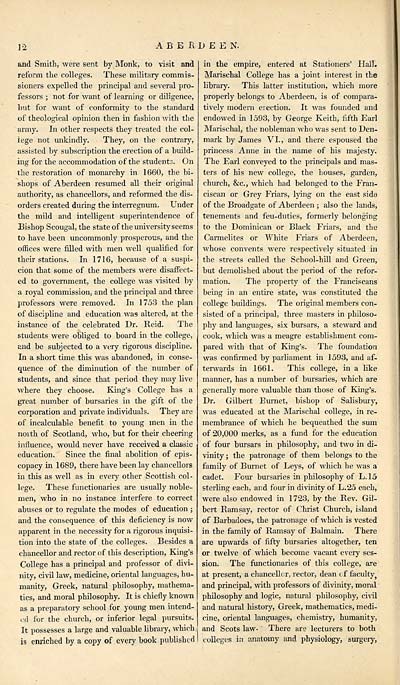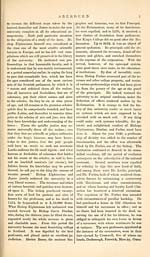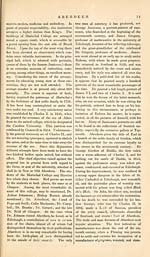Gazetteer of Scotland > Volume 1
(40) Page 12
Download files
Complete book:
Individual page:
Thumbnail gallery: Grid view | List view

12
ABERDEE N.
and Smith, were sent by Monk, to visit and
reform the colleges. These military commis-
sioners expelled the principal and several pro-
fessors ; not for want of learning or diligence,
but for want of conformity to the standard
of theological opinion then in fashion with the
army. In other respects they treated the col-
lege not unkindly. They, on the contrary,
assisted by subscription the erection of a build-
ing for the accommodation of the students. On
the restoration of monarchy in 1660, the bi-
shops of Aberdeen resumed all their original
authority, as chancellors, and reformed the dis-
orders created during the interregnum. Under
the mild and intelligent superintendence of
Bishop Scougal, the state of the university seems
to have been uncommonly prosperous, and the
offices were filled with men well qualified for
their stations. In 1716, because of a suspi-
cion that some of the members were disaffect-
ed to government, the college was visited by
a royal commission, and the principal and three
professors were removed. In 1753 the plan
of discipline and education was altered, at the
instance of the celebrated Dr. Reid. The
students were obliged to board in the college,
end be subjected to a very vigorous discipline.
In a short time this was abandoned, in conse-
quence of the diminution of the number of
students, and since that period they may live
where they choose. King's College has a
great number of bursaries in the gift of the
corporation and private individuals. They are
of incalculable benefit to young men in the
noith of Scotland, who, but for their cheering
influence, would never have received a classic
education. Since the final abolition of epis-
copacy in 1689, there have been lay chancellors
in this as well as in every other Scottish col-
lege. These functionaries are usually noble-
men, who in no instance interfere to correct
abuses or to regulate the modes of education ;
and the consequence of this deficiency is now
apparent in the necessity for a rigorous inquisi-
tion into the state of the colleges. Besides a
chancellor and rector of this description, King's
College has a principal and professor of divi-
nity, civil law, medicine, oriental languages, hu-
manity, Greek, natural philosophy, mathema-
tics, and moral philosophy. It is chiefly known
as a preparatory school for young men intend-
ed for the church, or inferior legal pursuits.
It possesses a large and valuable library, which
is enriched by a copy of every book published
in the empire, entered at Stationers' Hall.
Marischal College has a joint interest in the
library. This latter institution, which more
properly belongs to Aberdeen, is of compara-
tively modern erection. It was founded and
endowed in 1593, by George Keith, fifth Earl
Marischal, the nobleman who was sent to Den-
mark by James VI., and there espoused the
princess Anne in the name of his majesty.
The Earl conveyed to the principals and mas-
ters of his new college, the houses, garden,
church, &c, which had belonged to the Fran-
ciscan or Grey Friars, lying on the east side
of the Broadgate of Aberdeen ; also the lands,
tenements and feu-duties, formerly belonging
to the Dominican or Black Friars, and the
Carmelites or White Friars of Aberdeen,
whose convents were respectively situated in
the streets called the School-hill and Green,
but demolished about the period of the refor-
mation. The property of the Franciscans
being in an entire state, was constituted the
college buildings. The original members con-
sisted of a principal, three masters in philoso-
phy and languages, six bursars, a steward and
cook, which was a meagre establishment com-
pared with that of King's. The foundation
was confirmed by parliament in 1593, and af-
terwards in 1661. This college, in a like
manner, has a number of bursaries, which are
generally more valuable than those of King's.
Dr. Gilbert Burnet, bishop of Salisbury,
was educated at the Marischal college, in re-
membrance of which he bequeathed the sum
of 20,000 merks, as a fund for the education
of four bursars in philosophy, and two in di-
vinity ; the patronage of them belongs to the
family of Burnet of Leys, of which he was a
cadet. Four bursaries in philosophy of L.15
sterling each, and four in divinity of L.25 each,
were also endowed in 1723, by the Rev. Gil-
bert Ramsay, rector of Christ Church, island
of Barbadoes, the patronage of which is vested
in the family of Ramsay of Balmain. There
are upwards of fifty bursaries altogether, ten
or twelve of which become vacant every ses-
sion. The functionaries of this college, are
at present, a chancellor, rector, dean of facultyj
and principal, with professors of divinity, moral
philosophy and logic, natural philosophy, civil
and natural history, Greek, mathematics, medi-
cine, oriental languages, chemistry, humanity,
and Scots law- There are lecturers to both
colleges in anatomy and physiology, surgery,
ABERDEE N.
and Smith, were sent by Monk, to visit and
reform the colleges. These military commis-
sioners expelled the principal and several pro-
fessors ; not for want of learning or diligence,
but for want of conformity to the standard
of theological opinion then in fashion with the
army. In other respects they treated the col-
lege not unkindly. They, on the contrary,
assisted by subscription the erection of a build-
ing for the accommodation of the students. On
the restoration of monarchy in 1660, the bi-
shops of Aberdeen resumed all their original
authority, as chancellors, and reformed the dis-
orders created during the interregnum. Under
the mild and intelligent superintendence of
Bishop Scougal, the state of the university seems
to have been uncommonly prosperous, and the
offices were filled with men well qualified for
their stations. In 1716, because of a suspi-
cion that some of the members were disaffect-
ed to government, the college was visited by
a royal commission, and the principal and three
professors were removed. In 1753 the plan
of discipline and education was altered, at the
instance of the celebrated Dr. Reid. The
students were obliged to board in the college,
end be subjected to a very vigorous discipline.
In a short time this was abandoned, in conse-
quence of the diminution of the number of
students, and since that period they may live
where they choose. King's College has a
great number of bursaries in the gift of the
corporation and private individuals. They are
of incalculable benefit to young men in the
noith of Scotland, who, but for their cheering
influence, would never have received a classic
education. Since the final abolition of epis-
copacy in 1689, there have been lay chancellors
in this as well as in every other Scottish col-
lege. These functionaries are usually noble-
men, who in no instance interfere to correct
abuses or to regulate the modes of education ;
and the consequence of this deficiency is now
apparent in the necessity for a rigorous inquisi-
tion into the state of the colleges. Besides a
chancellor and rector of this description, King's
College has a principal and professor of divi-
nity, civil law, medicine, oriental languages, hu-
manity, Greek, natural philosophy, mathema-
tics, and moral philosophy. It is chiefly known
as a preparatory school for young men intend-
ed for the church, or inferior legal pursuits.
It possesses a large and valuable library, which
is enriched by a copy of every book published
in the empire, entered at Stationers' Hall.
Marischal College has a joint interest in the
library. This latter institution, which more
properly belongs to Aberdeen, is of compara-
tively modern erection. It was founded and
endowed in 1593, by George Keith, fifth Earl
Marischal, the nobleman who was sent to Den-
mark by James VI., and there espoused the
princess Anne in the name of his majesty.
The Earl conveyed to the principals and mas-
ters of his new college, the houses, garden,
church, &c, which had belonged to the Fran-
ciscan or Grey Friars, lying on the east side
of the Broadgate of Aberdeen ; also the lands,
tenements and feu-duties, formerly belonging
to the Dominican or Black Friars, and the
Carmelites or White Friars of Aberdeen,
whose convents were respectively situated in
the streets called the School-hill and Green,
but demolished about the period of the refor-
mation. The property of the Franciscans
being in an entire state, was constituted the
college buildings. The original members con-
sisted of a principal, three masters in philoso-
phy and languages, six bursars, a steward and
cook, which was a meagre establishment com-
pared with that of King's. The foundation
was confirmed by parliament in 1593, and af-
terwards in 1661. This college, in a like
manner, has a number of bursaries, which are
generally more valuable than those of King's.
Dr. Gilbert Burnet, bishop of Salisbury,
was educated at the Marischal college, in re-
membrance of which he bequeathed the sum
of 20,000 merks, as a fund for the education
of four bursars in philosophy, and two in di-
vinity ; the patronage of them belongs to the
family of Burnet of Leys, of which he was a
cadet. Four bursaries in philosophy of L.15
sterling each, and four in divinity of L.25 each,
were also endowed in 1723, by the Rev. Gil-
bert Ramsay, rector of Christ Church, island
of Barbadoes, the patronage of which is vested
in the family of Ramsay of Balmain. There
are upwards of fifty bursaries altogether, ten
or twelve of which become vacant every ses-
sion. The functionaries of this college, are
at present, a chancellor, rector, dean of facultyj
and principal, with professors of divinity, moral
philosophy and logic, natural philosophy, civil
and natural history, Greek, mathematics, medi-
cine, oriental languages, chemistry, humanity,
and Scots law- There are lecturers to both
colleges in anatomy and physiology, surgery,
Set display mode to: Large image | Transcription
Images and transcriptions on this page, including medium image downloads, may be used under the Creative Commons Attribution 4.0 International Licence unless otherwise stated. ![]()
| Gazetteers of Scotland, 1803-1901 > Gazetteer of Scotland > Volume 1 > (40) Page 12 |
|---|
| Permanent URL | https://digital.nls.uk/97424842 |
|---|
| Description | Volume I: Abbey to Glenartney. |
|---|---|
| Attribution and copyright: |
|
| Description | By Robert Chambers and William Chambers. Glasgow: Blackie & Son, 1838. 2 volumes. |
|---|---|
| Shelfmark | NF.1461.g.7 |
| Additional NLS resources: | |

